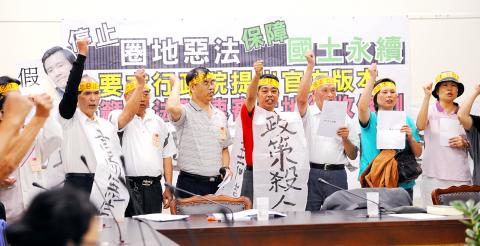Farmers from several locations across the country, including -Miaoli County’s Dapu (大埔), yesterday accused the government of lying and failing to fulfill promises it made last year on land expropriation.
“Article 15 of the Constitution protects people’s right to survival, work and to property. However, the current Land Expropriation Act (土地徵收條例) respects none of those rights,” Hsu Shih-jung (徐世榮), chair of National Chengchi University’s Department of Land Economics, told a press conference at the legislature.
EXPLOITATION

Photo: Lo Pei-der, Taipei Times
“The land expropriation system in Taiwan is a system that deliberately exploits the disadvantaged, because one of its criteria in choosing land for expropriation is to find a location where there will be only ‘minimum resistance,’ which is why most land takeover deals happened to farmers or other disadvantaged groups,” Hsu said.
Last year, President Ma Ying-jeou (馬英九), Premier Wu Den-yih (吳敦義) and Minster of the Interior Jiang Yi-huah (江宜樺) all promised representatives from farming rights advocates — including Hsu — that the government would seek to revise the Land Expropriation Act to better protect farmers’ rights.
“It’s been quite a while and this legislative session is about to end — and yet, still the government has failed to submit any draft amendments to the law,” Hsu said.
“During a press conference to celebrate the third anniversary of his inauguration, Ma talked about human rights; it’s a joke,” Hsu said.
“What about the rights of these farmers? He should stop lying,” he added
Moreover, the government has also broken its promises to the farmers from the farming village of Dapu.
The expropriation of Dapu farms sparked controversy last year when the Miaoli County Government sent excavators escorted by police into rice paddies belonging to landowners who were opposed to a land expropriation deal early in the morning without warning.
AGREEMENT
After a series of protests, Wu intervened and the government agreed to allow 19 households to keep their houses, while compensating landowners with new farmland that came with much needed irrigation systems.
“Both the central and local governments agreed to allow us to keep our homes. However, they changed their mind and now [four] of the houses will be pulled down,” a Dapu resident and spokeswoman for the Dapu Farmers’ Self-Help Association, Yeh Hsiu-tao (葉秀桃), said.
STANDING TOGETHER
Although not all houses would be torn down, they all stood together in solidarity, Yeh said.
Chang Huan-chang (張煥昌), a farmer from Wuri District (烏日), Greater Taichung, whose farmland is also scheduled to be expropriated for an urban development project, said the government should abandon its “economic development first” mentality.
“We need to think about food security,” Chang said. “Taiwan is a country with limited resources, but agriculture is something in which we really should be self-sustainable. As we grow more dependent on food supplies from other countries, we’re placing our future in the hands of others.”

An essay competition jointly organized by a local writing society and a publisher affiliated with the Chinese Communist Party (CCP) might have contravened the Act Governing Relations Between the People of the Taiwan Area and the Mainland Area (臺灣地區與大陸地區人民關係條例), the Mainland Affairs Council (MAC) said on Thursday. “In this case, the partner organization is clearly an agency under the CCP’s Fujian Provincial Committee,” MAC Deputy Minister and spokesperson Liang Wen-chieh (梁文傑) said at a news briefing in Taipei. “It also involves bringing Taiwanese students to China with all-expenses-paid arrangements to attend award ceremonies and camps,” Liang said. Those two “characteristics” are typically sufficient

A magnitude 5.9 earthquake that struck about 33km off the coast of Hualien City was the "main shock" in a series of quakes in the area, with aftershocks expected over the next three days, the Central Weather Administration (CWA) said yesterday. Prior to the magnitude 5.9 quake shaking most of Taiwan at 6:53pm yesterday, six other earthquakes stronger than a magnitude of 4, starting with a magnitude 5.5 quake at 6:09pm, occurred in the area. CWA Seismological Center Director Wu Chien-fu (吳健富) confirmed that the quakes were all part of the same series and that the magnitude 5.5 temblor was

The brilliant blue waters, thick foliage and bucolic atmosphere on this seemingly idyllic archipelago deep in the Pacific Ocean belie the key role it now plays in a titanic geopolitical struggle. Palau is again on the front line as China, and the US and its allies prepare their forces in an intensifying contest for control over the Asia-Pacific region. The democratic nation of just 17,000 people hosts US-controlled airstrips and soon-to-be-completed radar installations that the US military describes as “critical” to monitoring vast swathes of water and airspace. It is also a key piece of the second island chain, a string of

The Central Weather Administration has issued a heat alert for southeastern Taiwan, warning of temperatures as high as 36°C today, while alerting some coastal areas of strong winds later in the day. Kaohsiung’s Neimen District (內門) and Pingtung County’s Neipu Township (內埔) are under an orange heat alert, which warns of temperatures as high as 36°C for three consecutive days, the CWA said, citing southwest winds. The heat would also extend to Tainan’s Nansi (楠西) and Yujing (玉井) districts, as well as Pingtung’s Gaoshu (高樹), Yanpu (鹽埔) and Majia (瑪家) townships, it said, forecasting highs of up to 36°C in those areas